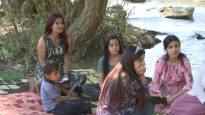On the scale of war-torn Syria, the Kurdish region is a success story, but education problems and the ending up of minors in military service worry young people and their parents.
In recent years, a persistent school dispute has been going on in the Kurdish region of Syria.
The dispute has pitted the Kurdish-led administration against some of the area’s teachers, parents and students.
The disagreements are over a curriculum approved by the Kurdish-led regime, which is not recognized elsewhere in Syria.
– The Arabic curriculum was canceled, and now there is only this new one. It is not recognized anywhere – so postgraduate studies are impossible at universities under the government of Damascus, says the man, who remains anonymous.
He does not want his name released because people have been arrested in connection with the controversy over the curriculum.
Some school children aspire to schools under the Assad regime
In Qamishli, the unofficial capital of the Kurdish-led regime, there are reports of students aspiring to the Syrian regime’s territory in the center of the city.
There are areas controlled by the Syrian army in the cities of Qamishil and Hasaka.
There are also schools where teaching is done according to the curriculum of the central government. There have been enough people coming to the schools, even though the teaching includes a real dose of the Syrian dictator Bashar al-Assad and his father Hafez al-Assad glorifying propaganda.
A significant part of the population of the informal self-governing region of northeastern Syria is Arab, but some Kurds have also, despite everything, wanted to send their children to schools where they study according to the doctrines of Damascus.
Northeast Syria came under the control of the Kurds in the early stages of the protests against President Assad that began in Syria in 2011 and the war that followed. Here there were no large-scale battles with the forces of the Assad regime, but the biggest threat was the extremist movement Isis.
New universities in the Kurdish region
The Kurdish-led administration is trying to build its own school system, and new universities have also been established in northeastern Syria in recent years, but they are very small institutions of a few hundred students.
In addition to traditional subjects, they study local specialties, such as the leader of the Kurdistan Workers’ Party, PKK of Abdullah Öcalan idea-based gynecology – gynecology.
If the path to further studies outside of northeastern Syria is blocked, it is a big problem for many, says the man we interviewed, who knows the school world well,
His own teenage sons recently embarked on a smuggling trip to Europe. One of them is still a minor.
– The boys didn’t see any future here, partly because of school problems. This is really hard for me, and I usually talk to them several times a day, the man says.
He guesses that there are thousands of young people in northern Syria who are about to leave the region.
The threat of violence drives people abroad
Similar considerations can be heard from a 20-year-old student from Qamishli Lava from Cangir which I meet near Derik in the picnic area where people have come to relax on their day off.
– People have the right to go elsewhere in search of a better life. I want our country to be safe and we could live here, but if you want a better future, you have to leave, Cangir says.
He studies at the state university under the Syrian Ministry of Education in the city of Hasaka.
Cangir thinks about leaving himself. He is driven by general insecurity and the desire for a normal, peaceful life without the threat of violence.
Accusations of military service of minors
– Some young people also go to escape conscription. There is now a lot of political pressure here for various reasons, says the interviewee, who remains anonymous.
“The Assad regime does not scare everyone”
The future of the Kurdish region is unclear, but some are already preparing for the return of Bashar al-Assad’s regime.
– There are so many threats, such as Turkey and the extremist movement Isis. At least in some areas, people are not afraid of the Assad regime and its return at all – they think that these areas are part of Syria after all, the Kurdish man reflects.
Kurdish leaders have been in contact with Damascus, but it is unclear what would happen to the self-ruled northeastern Syria if the Assad regime makes a comeback.
Before the wave of protests that started in Syria in 2011 and the war that followed, the Syrian Kurds were severely oppressed both linguistically and politically. There is hardly any return to it, or there will be a new resistance by the Kurds.
